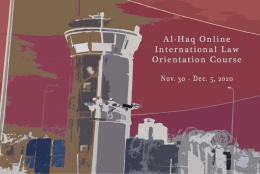On 5 December 2020, Al-Haq Center for Applied International Law concluded five days virtual international law orientation course. With 26 participants, representing 20 nationalities, including Palestinians in the diaspora, West Bank and the Gaza Strip, the orientation course focused on the applicable international law frameworks in the occupied Palestinian territory (OPT).
The participants further discussed vital human rights issues relating to the Palestinian question. Al-Haq legal researchers highlighted the application of the apartheid framework, international accountability available for the Palestinian people under international law, and business and human rights in the OPT. Badil- Resource Center for Residency and Refugee Rights highlighted the situation of Palestinian refugees and their right of return, whereas Addameer Prisoners Support and Human Rights Association underlined the situation of Palestinian prisoners and detainees in Israeli prisons and detention centres. The sessions also included an intervention on the rights of Palestinian children under occupation presented by Defense for Children International- Palestine, and the human rights situation in the Gaza strip with an intervention provided by the Palestinian Center for Human Rights in the Gaza Strip. Given Israel’s apartheid regime is entrenched over the Palestinian people as a whole, on both sides of the Green Line, a speaker from Nazareth underscored the human rights situation of the Palestinians citizens of Israel.
Finally, the participants virtually visited a number of communities across the OPT in the last two days of the course. Along with Al-Haq, they virtually visited the Jordan Valley, and conducted a field visit to the old city of Hebron. The Palestinian Institute of Public Diplomacy provided a video series of the Palestinian community of Khan Al- Ahmar, and Grassroots Al Quds accompanied the participants, virtually, to a visit to Jerusalem.
Providing a holistic approach to the Palestinian question, the orientation course covered different themes needed to comprehend the situation on the ground, and the applicable framework of international law in the OPT, including the tools of international accountability that can and should be utilised to put an end to Israeli impunity.


